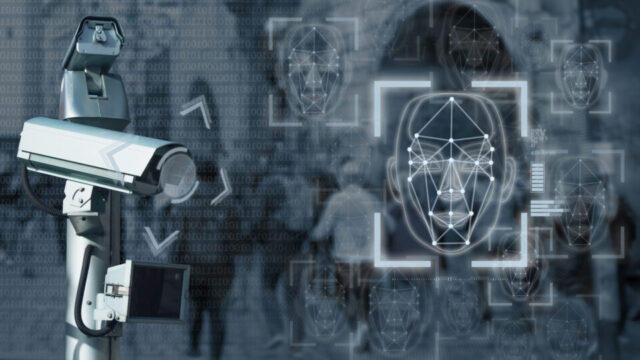Face Surveillance and Biometrics
Background
Facial recognition is an extremely powerful and dangerous surveillance technology. EPIC advocates for a ban on face surveillance.
Documents
Biometric surveillance systems, particularly face surveillance systems, poses significant threats to privacy. The increasing capabilities of facial recognition algorithms and easy access to photos online by private companies and governments has supercharged the deployment of face surveillance systems. Facial recognition allows for covert or even remote identification on a mass scale without consent. DNA, heartrate trackers, and other biometrics can reveal sensitive health data. EPIC is focused on stopping face surveillance and limiting collection and use of other biometric information.
Biometrics, Facial Recognition & Surveillance
Biometric identification uses a person’s physical characteristics to identify them. Biometric identification is uniquely powerful because we often leave traces or expose biometric data when in public spaces, it is personally identifiable information, and it uses features that individuals generally cannot change to avoid surveillance. Biometric identifiers include:
- Face prints
- Fingerprints
- Palm prints
- Walking patterns (i.e. gait recognition)
- Iris features
- Voice prints
- DNA
Facial recognition is distinctly dangerous because it is a keystone technology in 21st century mass surveillance. Facial recognition uses algorithms to match a picture of an unknown individual to a gallery of identified images based on facial features like the distance between a person’s eyes. The proliferation of available digital images created by security cameras, added online via social media, or collected by the government for routine purposes (e.g. passport photo) has created a wealth of data to use for face surveillance. And there is a lack of legal protections against the use of images for facial recognition. The result is that the images used to create the underlying algorithms and databases are often collected surreptitiously and without consent.
Facial recognition makes it easy to identify anyone at any time without their consent and even without their knowledge to track the movements of that person or connect that person to the copious amounts of information collected by the government and private sector. The technology also greatly increases the ability to conduct mass surveillance of large crowds. The dangers of facial recognition are growing as its uses expand.
Facial recognition can be used in almost every dimension of life, from banking and commerce to transportation and communications. Law enforcement use of facial recognition is particularly dangerous because it exacerbates protest policing and political repression, over-policing of minority communities, and risk of wrongful identification and wrongful arrest. Commercial facial recognition products are often used by law enforcement, blurring the line between corporations and the government. Clearview AI, for example, stole billions of images from social media sites and built a powerful facial recognition system off those images it sells law enforcement access to.
EPIC’s Work
EPIC works on many fronts to oppose the rollout of new facial recognition systems, enact bans on facial recognition at all levels of government, and cabin other biometrics to limited and transparent use. EPIC often comments on federal agencies’ proposed expansion of biometric surveillance through the Administrative Procedure Act. In 2020, EPIC and a coalition of privacy and civil liberties groups opposed a rulemaking by the Homeland Security Department (DHS) that would have massively expanded the use of biometrics across the agency. After comments and outreach to the Biden Administration, the policy was reversed in 2021.
EPIC also seeks to uncover undisclosed or under-reported facial recognition surveillance programs implemented by federal law enforcement agencies through Freedom of Information Act Requests and litigation.
Recent Documents on Face Surveillance and Biometrics
-
Testimony
Maryland SB169: Biometric Identifiers
-
Amicus Briefs
New Jersey v. Arteaga
New Jersey Superior Court Appellate Division
Whether a defendant who was identified using a facial recognition systems is entitled to detailed discovery on the system and the specifics of how he was identified.
-
APA Comments
EPIC Comments in re Federal Video and Image Analytics Research & Development Action Plan
September 2, 2022
-
Amicus Briefs
Citizens for Responsibility and Ethics in Washington (CREW) v. Department of Justice
US Court of Appeals for the District of Columbia Circuit
Whether the name of a contractor is "commercial" information exempt from disclosure under the Freedom of Information Act.
Top Updates
-
Facial Recognition Technology: Current and Planned Uses by Federal Agencies
Government Accountability Office | 2021
-
BIPA: The Most Important Biometric Privacy Law in the US?
Woodrow Hartzog | 2021
-
Report on Clearview AI
Office of the Canadian Privacy Commissioner | 2021
-
Gender Shades Project
Joy Buolamwini & Timnit Gebru | 2018
-
Facial Recognition Vendor Tests
National Institute of Standards and Technology
-
Garbage In, Garbage Out: Face Recognition on Flawed Data
Clare Garvie | 2019

Support Our Work
EPIC's work is funded by the support of individuals like you, who help us to continue to protect privacy, open government, and democratic values in the information age.
Donate